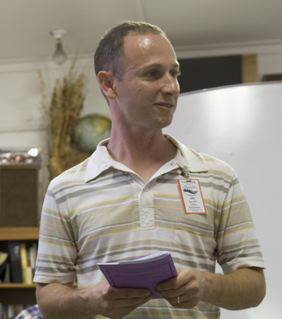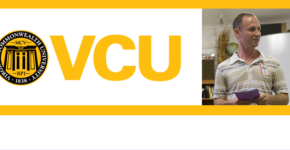 What should you do with your time while in jail?
What should you do with your time while in jail?
David Coogan, professor in the department of English at Virginia Commonwealth University, examines a writing exercise that could change your course once you are released.
Since 2006 David Coogan has been teaching writing workshops in autobiography at the Richmond City Jail (RCJ). The work has been supported by the College of Humanities and Sciences through its Student Engagement Program and the Career Enhancement Scholarships. It has earned praise through VCU’s 40 Acts of Caring Award. And it was a spotlighted project in VCU’s application to the President’s Commission on Higher Education Community Engagement Honor Roll. It has touched the lives of over five dozen inmates. And it has reached hundreds of VCU students enrolled in English 366: Writing and Social Change: Prison Writing.
Coogan is the author of “Moving Students into Social Movements: Prisoner Reentry and the Research Paper” (Active Voices: Composing a Rhetoric of Social Movements, edited by Patricia Malesh and Sharon Stevens, SUNY Press, 2009) and the co-editor with John Ackerman of The Public Work of Rhetoric: Citizen Scholars and Civic Engagement (University of South Carolina Press, 2010). He is currently finishing another book chapter on prison teaching, “Autobiography as Inquiry: Crafting and Ethical Code in Jail,” which will appear in Working for Justice: A Handbook for Prison Teaching and Activism, edited by Stephen Hartnett, Jennifer Kay Woodward, and Eleanor Novek (University of Illinois Press, 2013) and a book-length manuscript based on his first autobiography workshop, Writing Our Way Out: Memoirs from Jail.
Changing the Narrative in Jail
There are many reasons why people end up in jail: unjust laws, implicit bias in policing, economic incentives for mass incarceration, and the enduring legacies of structural racism. But before the first arrest and the arraignment, there were choices, however compromised and tragic, that became part of a narrative leading that person into jail, choices that can be revisited and reevaluated to form a new narrative to keep the person out of jail. Writing your life story in jail can help you change your life.
A poor man with some anxiety over his physical appearance watching older drug dealers getting positive attention from women and the respect of other men who starts selling drugs has just discovered a cure to his anxiety and a way to make money. To ask that man to write that story of how and why he began selling drugs is to ask him to restructure relationships between discourse, identity and self-determination. He might start by talking about “dudes” and “broads” who give him “power” and “respect” but then look back at that identity and draw another conclusion refracted through the discourse of recovery realizing it was “low self esteem” causing his defeat.
If there is buried treasure in life writing, the glittering reward is not The Self but shards of self that can be formed into something new. It’s not the truth with a capital T but the truth most needed to move forward with the plot. The difficulty comes when the writing ends and the living begins; when the person is free to become the new character that he or she constructed. A writing workshop cannot change the realities of peer pressure, addiction, unemployment, anxieties over gender and sexuality, status and money, much less the historical inequities of poverty and racism. But it can help the incarcerated change their narratives for contending with these realities.

Comments
One response to “David Coogan, Virginia Commonwealth University – Changing the Narrative in Jail”
Where can I get your book OUR WAY OUT: MEMOIRS FROM JAIL? PLEASE LET ME KNOW. WE ARE SUPPOSE TO READ FOR OUR BOOK CLUB.
Nona Akos
[email protected]
720 476 3735